#PlayWright Training in India
Explore tagged Tumblr posts
Text
Omegaverse and the Theatre: Idea Dump
Please build upon/ argue against/ take inspiration from these prompts!!!!! They’re based on a history of theatre class I took last semester
For a good 300+ years or so, betas would be the only people who could act for an occupation.
This was because a lot of startup theatre companies feared alphas and omegas releasing hormones on stage as they grew commercially. The effects of this still linger on, with betas having a significant percentage of acting jobs over alphas and omegas combined
Interestingly enough, omegas were allowed back on the stage before alphas (because stereotypes icky)
This isn’t to imply that hormones entirely disappeared during a performance. It’s just that for a long period of time, its presence was dulled down and de-emphasized in place of plot
Many of that era’s beta playwrights (including Shakespeare) wrote pieces about alphas and omegas as a way of mocking/satirizing them, often ironically making them reference their scents/hormones. Much of that nuance is lost now due to shifted beliefs in dynamics/culture/language
Back when theatre was first used, like for religious rituals, there would often be a synchronization of hormones.
Examples include: in Greece, the chorus often repeated phrases to incite/signal a hormone shift. In India, the hormone shifts were dependent on a director’s drum line
Some of these actors would train for decades as soon as they presented, in order to control their scent/hormone release
In fact, many physiological/anthropological historians would cite these actors as the first to master scent suppressing, jumping ahead of the medicinal/scientific curve by about a thousand years!
Sometime in the 20th century, people starting really experimenting with instinct driven theatre.
There is no script to these performances. Actors have to live through a scene/prompt designed to trigger an instinctual reaction (such as a mother losing their child, a territory brawl, etc)
I imagine it was made in reaction to world events at the time, or as a response to older art movements. The origins of Dadaism come to mind here
Everything is consensual, obviously, but it’s considered highly controversial to the public. Some write it off as an “exasperated grab at catharsis” and others praise it for its “inescapable rawness”.
Nowadays, it’s mostly used in improv, for both tragedy and comedy. Most actors find it daunting, but in the last few years, armature improv clubs have started doing instinct-comedic bits with major media outreach
In the last few decades, therapists/psychologists have attempted instinct-driven theatre as a form of therapy. This is even more controversial than the art form itself
#omegaverse#a/b/o#a/b/o blog#a/b/o dynamics#a/b/o verse#omegaverse headcanon#omegaverse worldbuilding#a/b/o headcanon#a/b/o worldbuilding#omegaverse theatre
108 notes
·
View notes
Text
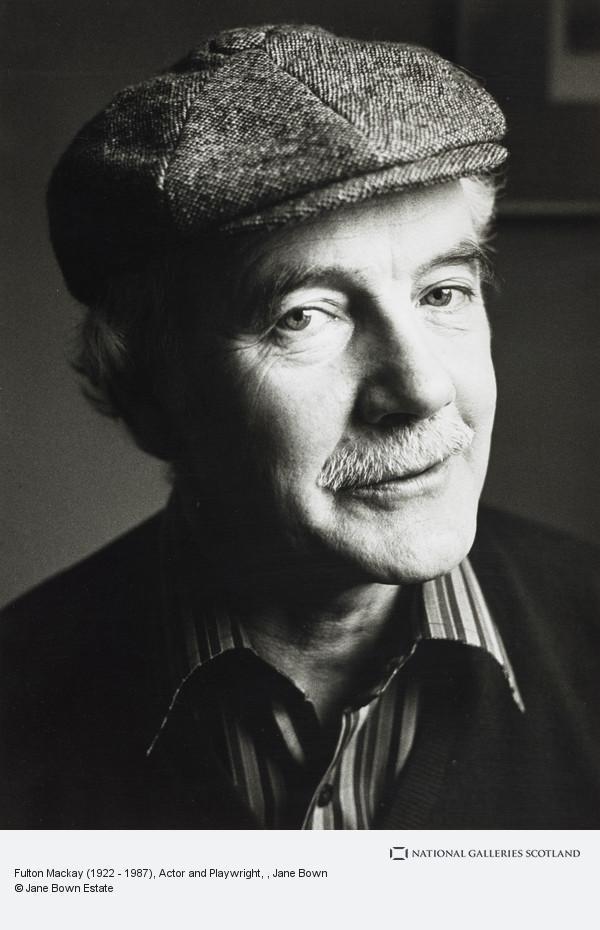
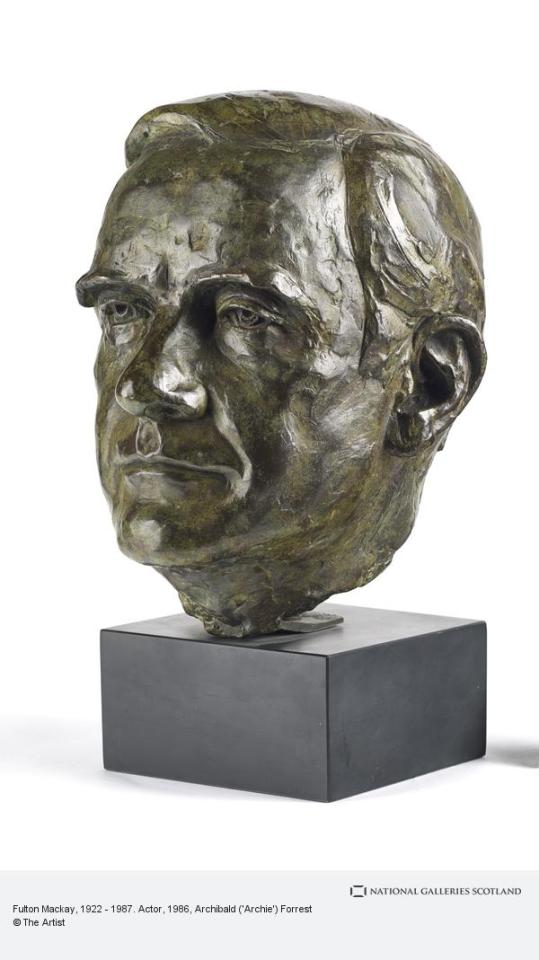
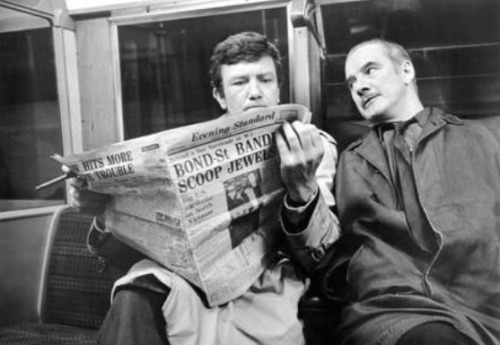
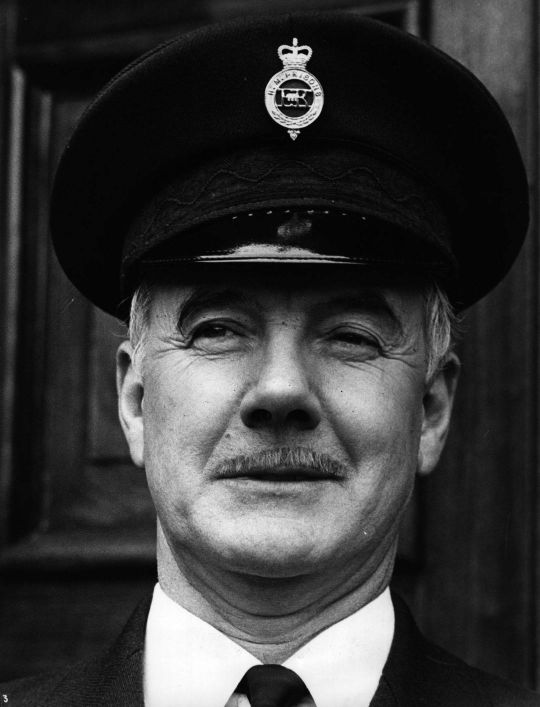
The Scottish actor Fulton McKay was born on August 12th 1922 in Paisley.
William Fulton Beith Mackay was brought up in Clydebank by a widowed aunt after the death of his mother from diabetes. His father was in the NAAFI.
On leaving school, he trained as a quantity surveyor and later volunteered for the Royal Air Force in 1941 but was not accepted because of a perforated eardrum. He then enlisted with the Black Watch and he served for five years during the Second World War, which included three years spent in India.
After being demobbed, Mackay began training as an actor at RADA. Mackay was one of Scotland’s most versatile and best-loved character actors. From 1949 he was a member of the Citizens Theatre Company where he worked with Duncan Macrae and Stanley Baxter. His career on stage and in film and television was cemented by his work as a playwright for BBC Scotland. Fulton appeared in may shows during his career, including The Master of Ballantrae, Rob Roy, Z Cars, Some Mothers Do ‘Ave ‘Em but it was his role a the comic menace that was prison officer Mr Mackay in the 1970s comedy series ‘Porridge’,that was his most popular television role.
With Porridge it is well documented that Fulton could be quite irritating to the other cast members as he was such a perfectionist. He was constantly wanting to try scenes again and again. It has to be said, however, that this fine attention to detail paid dividends, as his performances were always flawless.
Mackay developed a movie career post-Porridge appearing in Britannia Hospital, Local Hero and Defense of the Realm . On the small screen other roles included Z Cars, returning over several shows, but as three differing characters, he played Keir Hardie in a 70’s mini series called Shoulder to Shoulder, Special Branch, Crown Court and two Scottish series, The Master of Ballantrae and Rob Roy. Many of you younger ones out there might recall Fulton Mackay as Captain, in our own version of Fraggle Rock.
On June 22nd 1987 Fulton Mackay lost his fight against stomach cancer, he was 64.
7 notes
·
View notes
Text
Benedict Cumberbatch Net Worth 2023

Benedict Cumberbatch is a highly acclaimed English actor known for his versatile performances on stage, television, and film. He was born in London in 1976 and studied drama at the University of Manchester before training at the prestigious London Academy of Music and Dramatic Art. Cumberbatch gained recognition for his roles in the television series "Sherlock," for which he received multiple awards, and the film "The Imitation Game," which earned him an Academy Award nomination for Best Actor. He has also appeared in numerous other films and TV shows, including "Doctor Strange," "Star Trek Into Darkness," and "The Hobbit" trilogy. Cumberbatch is widely regarded as one of the most talented actors of his generation and has a devoted fan base around the world.
Family Background
Benedict Cumberbatch comes from a family with a rich and diverse background. His ancestry includes English, Scottish, Welsh, and even a distant French Huguenot descent. Let's take a closer look at his family background.
Cumberbatch's father, Timothy Carlton, is also an actor who has appeared in numerous TV shows and films. He was born Timothy Carlton Congdon Cumberbatch in 1944 and later changed his name to Timothy Carlton to avoid confusion with another actor. Carlton's father, Henry Carlton Cumberbatch, was a British diplomat who served in various countries, including Turkey, Lebanon, and Iran.
Cumberbatch's mother, Wanda Ventham, is also an actress who has appeared in several British TV shows and films. She was born in 1935 in Brighton, England, to a British father and a Czechoslovakian mother. Ventham's father, Frederick Ventham, was a British army officer who served in India and Burma during World War II.
Cumberbatch has a younger sister named Tracy Peacock, who is a novelist and playwright. She was born in 1973 and has published several acclaimed works, including the novel "The Life and Loves of a She-Devil."
Cumberbatch's family has a long history of academic and artistic achievements. His great-grandfather, Henry Arnold Cumberbatch, was a prominent British mathematician and logician who served as a fellow at Cambridge University. His great-great-grandfather, Robert William Cumberbatch, was a bishop of Barbados in the late 19th century.
Cumberbatch's family background has undoubtedly influenced his own interests and pursuits. He has often spoken about the importance of his family and how they have supported him throughout his career. With such a diverse and accomplished family, it is no wonder that Cumberbatch has become one of the most talented actors of his generation.
Net Worth And Salary
Benedict Cumberbatch is one of the most successful actors in the world, with a career that has spanned television, film, and theater. As a result of his success, he has amassed a significant net worth through his earnings from acting roles, endorsements, and investments.
Net Worth: According to Celebrity Net Worth, Benedict Cumberbatch's net worth is estimated to be around $40 million as of 2023. This is a significant increase from his reported net worth of $30 million in 2021. His net worth is expected to continue growing in the coming years as he takes on new projects and expands his investment portfolio.
Salary: Benedict Cumberbatch's salary for acting roles varies depending on the project and his role in it. For example, he reportedly earned $250,000 per episode for his role in the BBC series "Sherlock." His salary for films has also varied, with some sources reporting that he earned $2.5 million for his role in "Doctor Strange" and $6.5 million for "Avengers: Infinity War."
Endorsements: In addition to his acting earnings, Benedict Cumberbatch has also earned money through various endorsements. He has been a brand ambassador for brands such as Dunhill, Jaguar, and Samsung. In 2018, he signed a deal with high-end watchmaker Jaeger-LeCoultre to become a brand ambassador for the company.
Investments: Benedict Cumberbatch has also made investments in various ventures, including the production company SunnyMarch, which he co-founded in 2013. The company has produced several successful films and television series, including "Patrick Melrose," "The Child in Time," and "The Courier." Cumberbatch also owns a stake in a London-based restaurant and bar, called the Marylebone Filling Station.
In conclusion, Benedict Cumberbatch's net worth, salary, and endorsements are a testament to his success and talent as an actor. He has earned a significant amount of money through his acting roles, endorsements, and investments, and his net worth is expected to continue growing in the coming years. His diverse range of investments and endorsements indicate that he is not only a talented actor, but also a savvy businessman. Read More...
2 notes
·
View notes
Text
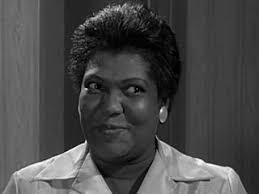
Pearl Prescod (1920 - 25 June 1966)
Pearl Priscilla Prescod was a Tobagonian actress and singer. She was one of the earliest Caribbean entertainers to appear on British television and was the first Black woman to appear at London's National Theatre.
Prescod arrived in Britain in the early 1950s and resided in Notting Hill, London. During her time in Britain, Prescod was casted in numerous television roles and theatre productions, and was active in the anti-racism struggle in London in the late 1950s and early '60s. Prescod helped co-ordinate London's first Caribbean Carnival with her close friend, journalist and activist, Claudia Jones. The first Carnival took place in St Pancras Town Hall in January 1959.
Pearl Prescod was a trained classical singer and had aspirations to pursue a classical music education in England. She arrived in Britain in the early 1950s after winning a musical scholarship to Guildhall School of Music.
In 1954, Prescod was casted in Barry Reckord's first play Flesh to a Tiger (previously called Della). The play also starred Cleo Laine, Nadia Cattouse and Lloyd Reckord.
In 1955, the secretary of the West India Committee in London helped Prescod secure a job as a switchboard operator in his office and an audition at the BBC. She successfully procured a number of BBC contracts and landed many television roles and plays over the years.
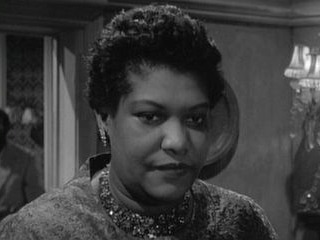
Prescod was part of a West Indian singing group called The New World Singers and was the leader of the sopranos in the choir. The others were Patricia Williams (St Vincent), Bonica Fletcher (Jamaica) and Joyce Jacobs (British Guiana). Impressed with hearing a group of West Indian singers, conductor and composer Avril Coleridge-Taylor formed the choir.
In 1959 Sylvia Wynter's play Under The Sun was re-broadcast by the BBC. Prescod had a part in the play along with Nadia Cattouse, Andrew Salkey, Sheila Clarke, Gordon Woolford and Sylvia Wynter.
During her stage career, Prescod was a member of the National Theatre Company and was casted as Tituba in the 1965 production of The Crucible. She received wide praise for her performance.
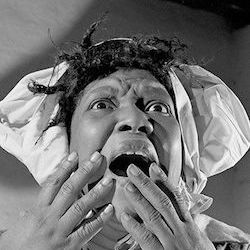
(Photo credit: Pearl Prescod as Tituba in The Crucible, 1965. Photographer: Chris Arthur)
Prescod's contributions to the struggle for racial equality in Britain was recognised. She played an active role alongside Claudia Jones, and was involved in organising the March on Washington solidarity demonstration in London on 31 August 1963.
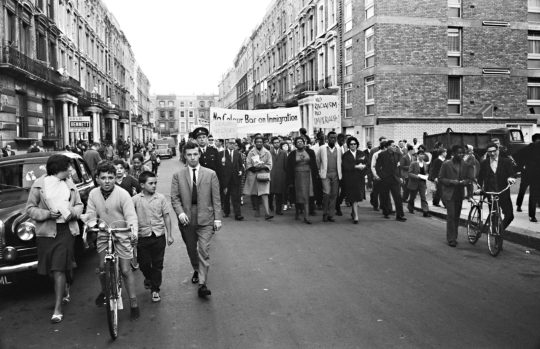
(Photo credit: Claudia Jones and Pearl Prescod leading the March on Washington solidarity demonstration in London, August 31, 1963. Photographer: John ‘Hoppy’ Hopkins)
Prescod died on 25 June 1966 in Kensington, England and is survived by her son Colin Prescod, sociologist and trustee of the Friends of the Huntley Archives at LMA.
Prescod is the subject of a chapter written by Obi B. Egbuna, the Nigerian-born novelist, playwright and political activist, in his non-ficton work titled Black Candle at Christmas.
Text above extracted from the Wikipedia article I created about Pearl Prescod this week: https://en.wikipedia.org/wiki/Pearl_Prescod
71 notes
·
View notes
Text
Events 5.18
332 – Emperor Constantine the Great announces free distributions of food to the citizens in Constantinople. 872 – Louis II of Italy is crowned for the second time as Roman Emperor at Rome, at the age of 47. His first coronation was 28 years earlier, in 844, during the reign of his father Lothair I. 1096 – First Crusade: Around 800 Jews are massacred in Worms, Germany. 1152 – The future Henry II of England marries Eleanor of Aquitaine. He would become king two years later, after the death of his cousin once removed King Stephen of England. 1268 – The Principality of Antioch, a crusader state, falls to the Mamluk Sultan Baibars in the Siege of Antioch. 1291 – Fall of Acre, the end of Crusader presence in the Holy Land. 1302 – Bruges Matins, the nocturnal massacre of the French garrison in Bruges by members of the local Flemish militia. 1388 – During the Battle of Buyur Lake, General Lan Yu leads a Chinese army forward to crush the Mongol hordes of Tögüs Temür, the Khan of Northern Yuan. 1499 – Alonso de Ojeda sets sail from Cádiz on his voyage to what is now Venezuela. 1565 – The Great Siege of Malta begins, in which Ottoman forces attempt and fail to conquer Malta. 1593 – Playwright Thomas Kyd's accusations of heresy lead to an arrest warrant for Christopher Marlowe. 1631 – In Dorchester, Massachusetts, John Winthrop takes the oath of office and becomes the first Governor of Massachusetts. 1652 – Slavery in Rhode Island is abolished, although the law is not rigorously enforced. 1756 – The Seven Years' War begins when Great Britain declares war on France. 1783 – First United Empire Loyalists reach Parrtown (later called Saint John, New Brunswick), Canada, after leaving the United States. 1794 – Battle of Tourcoing during the Flanders Campaign of the War of the First Coalition. 1803 – Napoleonic Wars: The United Kingdom revokes the Treaty of Amiens and declares war on France. 1804 – Napoleon Bonaparte is proclaimed Emperor of the French by the French Senate. 1811 – Battle of Las Piedras: The first great military triumph of the revolution of the Río de la Plata in Uruguay led by José Artigas. 1812 – John Bellingham is found guilty and sentenced to death by hanging for the assassination of British Prime Minister Spencer Perceval. 1843 – The Disruption in Edinburgh of the Free Church of Scotland from the Church of Scotland. 1848 – Opening of the first German National Assembly (Nationalversammlung) in Frankfurt, Germany. 1860 – Abraham Lincoln wins the Republican Party presidential nomination over William H. Seward, who later becomes the United States Secretary of State. 1863 – American Civil War: The Siege of Vicksburg begins. 1896 – The United States Supreme Court rules in Plessy v. Ferguson that the "separate but equal" doctrine is constitutional. 1896 – Khodynka Tragedy: A mass panic on Khodynka Field in Moscow during the festivities of the coronation of Russian Tsar Nicholas II results in the deaths of 1,389 people. 1900 – The United Kingdom proclaims a protectorate over Tonga. 1912 – The first Indian film, Shree Pundalik by Dadasaheb Torne, is released in Mumbai. 1917 – World War I: The Selective Service Act of 1917 is passed, giving the President of the United States the power of conscription. 1926 – Evangelist Aimee Semple McPherson disappears in Venice, California. 1927 – The Bath School disaster: Forty-five people, including many children, are killed by bombs planted by a disgruntled school-board member in Michigan. 1927 – After being founded for 20 years, the Government of the Republic of China approves Tongji University to be among the first national universities of the Republic of China. 1933 – New Deal: President Franklin D. Roosevelt signs an act creating the Tennessee Valley Authority. 1944 – World War II: Battle of Monte Cassino: Conclusion after seven days of the fourth battle as German paratroopers evacuate Monte Cassino. 1944 – Deportation of Crimean Tatars by the Soviet Union government. 1948 – The First Legislative Yuan of the Republic of China officially convenes in Nanking. 1953 – Jackie Cochran becomes the first woman to break the sound barrier. 1955 – Operation Passage to Freedom, the evacuation of 310,000 Vietnamese civilians, soldiers and non-Vietnamese members of the French Army from communist North Vietnam to South Vietnam following the end of the First Indochina War, ends. 1965 – Israeli spy Eli Cohen is hanged in Damascus, Syria. 1969 – Apollo program: Apollo 10 is launched. 1973 – Aeroflot Flight 109 is hijacked mid-flight and the aircraft is subsequently destroyed when the hijacker's bomb explodes, killing all 82 people on board. 1974 – Nuclear weapons testing: Under project Smiling Buddha, India successfully detonates its first nuclear weapon becoming the sixth nation to do so. 1977 – Likud party wins the 1977 Israeli legislative election, with Menachem Begin, its founder, as the sixth Prime Minister of Israel. 1980 – Mount St. Helens erupts in Washington, United States, killing 57 people and causing $3 billion in damage. 1980 – Students in Gwangju, South Korea begin demonstrations calling for democratic reforms. 1990 – In France, a modified TGV train achieves a new rail world speed record of 515.3 km/h (320.2 mph). 1991 – Northern Somalia declares independence from the rest of Somalia as the Republic of Somaliland but is not recognized by the international community. 1993 – Riots in Nørrebro, Copenhagen, caused by the approval of the four Danish exceptions in the Maastricht Treaty referendum. Police open fire against civilians for the first time since World War II and injure 11 demonstrators. 1994 – Israeli troops finish withdrawing from the Gaza Strip, ceding the area to the Palestinian National Authority to govern. 2005 – A second photo from the Hubble Space Telescope confirms that Pluto has two additional moons, Nix and Hydra. 2006 – The post Loktantra Andolan government passes a landmark bill curtailing the power of the monarchy and making Nepal a secular country. 2009 – The LTTE are defeated by the Sri Lankan government, ending almost 26 years of fighting between the two sides. 2015 – At least 78 people die in a landslide caused by heavy rains in the Colombian town of Salgar. 2018 – A school shooting at Santa Fe High School in Texas kills ten people.
3 notes
·
View notes
Text
Maud Wood Park: Forgotten Feminist, Proto-Anthropologist, Bad Bitch
In the summer of 2018, I spent three weeks in the Library of Congress researching twentieth-century women political leaders (think suffragettes, early legislators, etc).
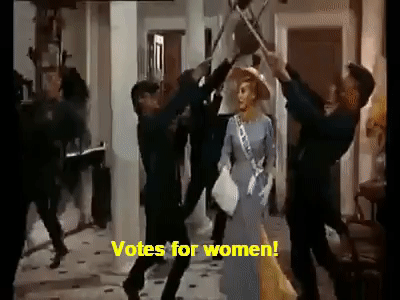
Mostly I skimmed workshop pamphlets and stared, unblinking, at indecipherable handwritten correspondence. But one woman in particular had me rapt.
[Extremely Stefon voice] Maud Wood Park’s story has everything - suffragette drama, a trip around the world, and a secret (second! Post divorce! That scandalous queen!) marriage that *definitely* disappointed her dad.
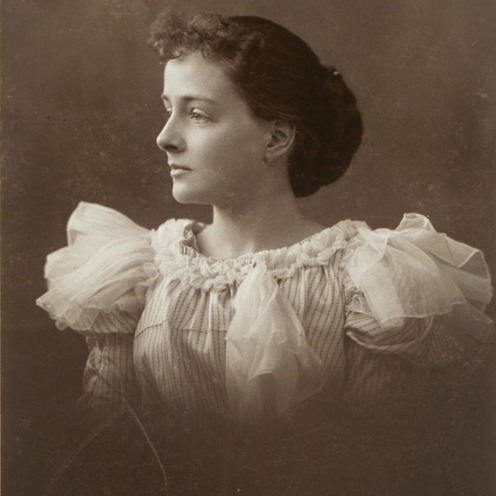
(Photo from: https://www.radcliffe.harvard.edu/schlesinger-library/collection/papers-maud-wood-park-in-womans-rights-collection)
Born in 1871 in Boston, Maud Wood Park was a no-nonsense activist ahead of her time. I call her “forgotten” even though she’s well-known to scholars of women’s suffrage (NERRRDS), because she’s largely left out of public school lessons featuring big names like Susan B. Anthony and Elizabeth Cady Stanton. Yet her work as a lobbyist with the National American Woman Suffrage Association and as the first president of the League of Women Voters made her a centrally important figure in the struggle for American women’s suffrage.

(Maud pictured 4th from the right. Photo from: https://www.radcliffe.harvard.edu/schlesinger-library/collection/papers-maud-wood-park-in-womans-rights-collection)
Even more interesting than her activism (lol sorry, women’s rights) was her personal life.
Maud did her own damn thing - she chose not to have children, eschewed religion, traveled around the world without a male escort, and never stopped fighting for women’s rights. She married her first husband after meeting him in college (she went to Radcliffe, A.K.A. ~Lady Harvard~ because She Smart And She Fancy), and then divorced his ass when she was 35. Two years later, she ~secretly~ married Robert “Bob” Hunter Freeman.
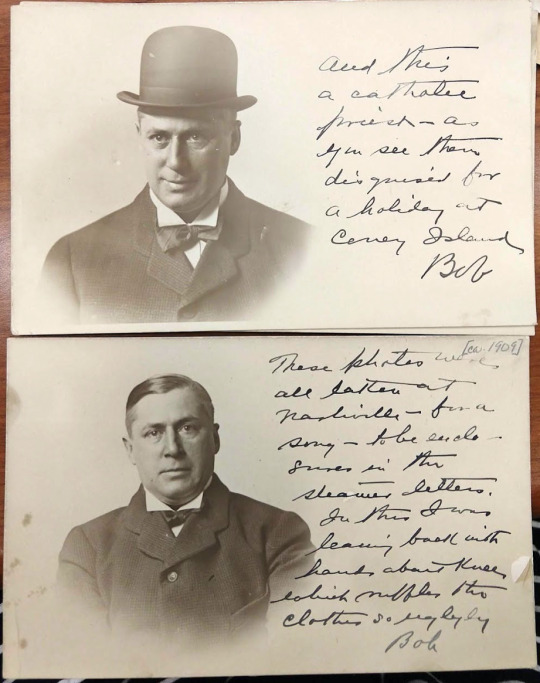
(Above: Bob and his bowler hat. Photos from the LoC collections)
Bob was ~an actor~ and theatrical agent (yes Maud, I feel you, who among us has not pined for a sensitive artistic type). They both traveled so often for work that they were never able to officially, publicly settle down and cohabitate. Instead, their marriage remained secret to all but a few close friends, and they met clandestinely in hotel rooms during Maud’s lecture circuits. They also shared a robust (there are SO MANY LETTERS, you guys) correspondence. Many of their letters focus on their interpersonal drama and semi-tempestuous but deeply-loving relationship, and you bet I read all that shit.
They had serious differences and disagreed constantly. Bob gave Maud shit about her temperament and lack of religion, and she gave him shit about his lack of logic.
In the 1915 letter to Bob below, Maud openly and unrepentantly admits to being a stone-cold bitch (my heroine..!), describing herself as “a cold, hard, self-contained, self-centred, ambitious and extremely critical woman.”
(Maud’s a Slytherin. Obvs.)
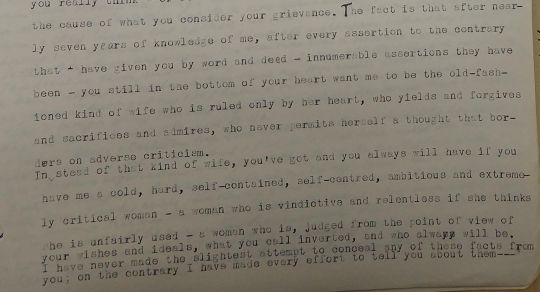
Maud knows herself. Maud accepts herself. Maud does not care about your feelings.
Bob, on the other hand, was a total Hufflepuff. In the funny 1915 letter below, Maud writes to him about how much her “man-hating” spinster friends love him, seeing him as more of a womanly kindred spirit than a man. Their high praise even inspires her to (grudgingly, poorly... Maud is all of us) embroider Bob’s initials onto some handkerchiefs, even though she “hadn’t done anything of that sort for over 20 years.”
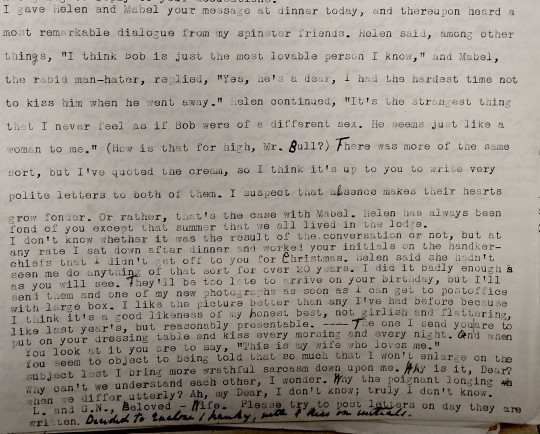
Ah, ~True Love~ :’)

(Above: Maud and Bob, basically)
Maud was an independent thinker, and her lack of religious belief troubled Bob at first. She explained her outlook on life to him in a 1908 letter:
“I feel a sort of responsibility to myself and to others, irrespective of God’s existence or non existence. I think it is the effect of my keen perception of the rights of all other living creatures, black, white or brown, animal as well as human. It explains my passionate democracy and my sense of outrage at the injustices that women have to bear. It does not rest on love of God or recognition of Him; not even on love of men, but rather on the craving of my whole nature for justice. It’s the best thing in me, my only effective weapon against my egoism.”
Clearly, humanist ideals fueled her activism at a time when many involved in social reform movements held beliefs rooted in Christianity.
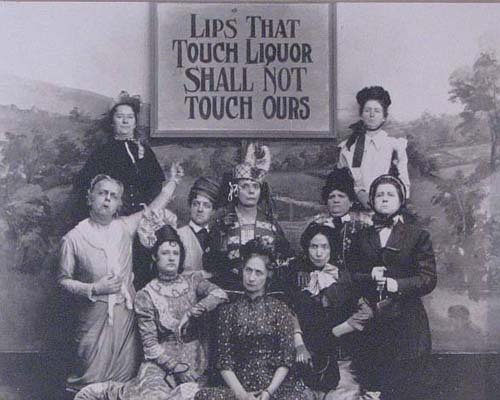
(Above: the Women’s Christian Temperance Union, for example! Photo from: https://sites.google.com/site/orangewomenstemperanceunion/background-on-women-s-christian-temperance-union)
Maud was also kind of an amateur anthropologist - she traveled around the world to study the conditions of women in various cultures.
Funded by a wealthy sponsor who supported her work for women’s rights, she struck out on a two year journey in 1909 to investigate women’s lives in far-flung locales including Singapore, China, India, Australia and New Zealand, New Guinea, Bhutan, and elsewhere.
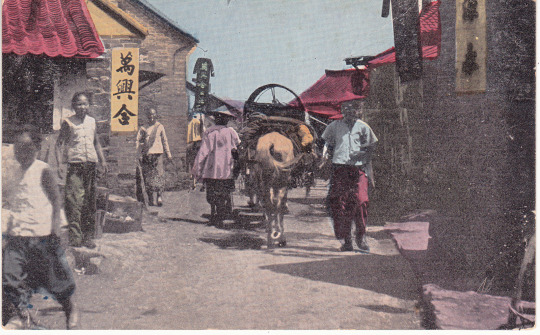
(Above, postcard of Chefoo, China, circa 1908, from: https://www.hippostcard.com/listing/street-in-chefoo-china-postcard-c1908/16726374)
Her views reflect the times and an understanding of universal womanhood that’s been deconstructed by postcolonial feminist scholars, but she recognized the importance of cultural differences.
Before women could even vote in the U.S., Maud was going around stressing the need to understand the various ways women lived around the world.
Rather than just exoticizing foreign tropical locales, she described their complexities. Maud talked about the widespread poverty in Chinese villages in the wake of nineteenth-century British imperialism and described India as “huge and enormously complicated” in a February 9th, 1920 letter written on a train from Darjeeling to Calcutta, for example.
She exhibited an anthropological curiosity (even if she lacked a little tact), writing this detailed description to Bob on June 18th, 1909:
“This afternoon I did get off by myself in a rickshaw in a town I never heard of and poked around for an hour in unimaginably dirty and crowded streets. The Yang-tse-Kiang is a beautiful broad river, but almost deserted on the banks except for occasional cities of large towns where the foreign “Concession” is nearly opposite the landing. If we can we get away from the Concession in these places and into the Chinese town, usually enclosed by a wall. There indeed everything is different: muddy, smelly, narrow streets, swarms of men, some children and fewer women, (those who are well-to-do stay in the “Inner Apartment”) endless little dingy restaurants half on the street where the cooking is all in plain sight, ramshackle one-story houses leaning against each other in order to stay up at all. Most foreigners are disgusted and flee as soon as possible, but I enjoy it all and want to go poking up every lane and into every courtyard.”
Maud also recognized the pervasiveness of Western culture way before scholars started theorizing about “globalization.” In 1909, she wrote:
“Fate seems always to pull at my skirts and drag me back to the surroundings of the inescapable West. It’s marvelous how pervasive that is out here in the Orient – the trace of the West. –I begin to believe that there isn’t a village in Asia where you can’t buy bottled waters and find at least one Englishman. I may have to go to central Africa to get the unadulterated East; and even there I suppose I’d find T. Roosevelt or his remains.”
I choose to believe that she would have made a good intersectional feminist activist and anthropologist had she been born a few decades later.
Maud stressed that women deserved freedom above all in both her personal and professional life. She lobbied for women’s rights tirelessly both to legislators and to Bob, who started out skeptical but was eventually won over.
In the 1915 letter below, Bob wishes Maud success and writes that he’s come around in favor of women’s suffrage once and for all, finally convinced “of something which perhaps should always have been obvious, but wasn’t.”
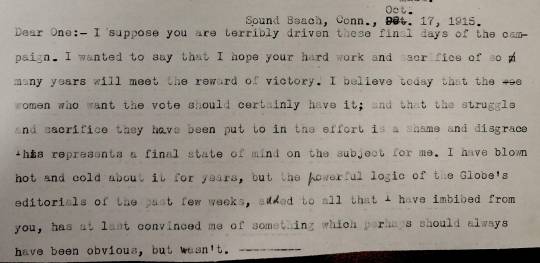
(That’s f***ing right Bob, get it together)
Maud Wood Park - world traveler, legislative expert, and even playwright - was a fierce feminist. She seemed to foreshadow the third-wavers of the future. In a 1912 letter (one of her many extended arguments with Bob), she considered the future of the women’s movement and women’s ultimate place in society:
“I resent so bitterly the arrogance of men who attempt to say that what men want is the measure of what women should be – or the added insult of attempting to interpret Nature or the Creator for women. Certainly if there is any record of what nature intended it is to be found in the powers that she has given women. If a woman has a beautiful voice it seems likely that nature meant her to sing, etc., etc.
The moral of all this is – don’t spend any more time or words or ink in trying to show what women were meant to do. Spend your energy in giving women themselves a chance to show what they were meant to be.”
Amen.
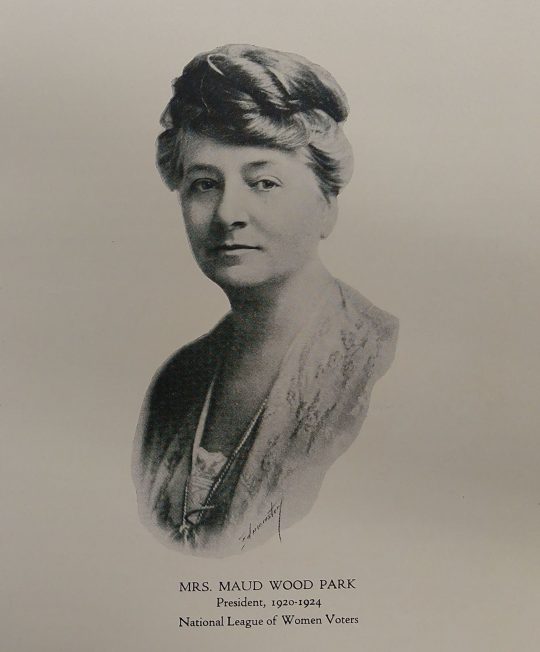
#Maud Wood Park#Feminism#suffrage#women#women's rights#feminist#history#anthropology#research#archives#womens liberation#suffragette#votes for women#romance#star-crossed lovers#herstory#women's history
2 notes
·
View notes
Text
~CXL~Study Msc Pharmaceutical Sciences from Trinity College Dublin, Ireland
~CXL~
Trinity is Ireland’s leading university and is ranked 104th in the world* Trinity delivers world class education and employers worldwide hold Trinity graduates in high esteem. Graduates include Nobel Prize winners in literature, science and medicine; presidents and world leaders; award-winning actors and film makers; internationally renowned poets and playwrights, entrepreneurs and business leaders. Dublin is a vibrant, multicultural, European capital and Trinity students take full advantage of everything the university and the city have to offer. The vibrant social scene in the city and on campus ensures that students enjoy a unique university experience. Trinity's main campus of cobbled squares, historic buildings and green playing fields also includes state-of-the-art modern facilities for teaching and research and a Sports Centre with a climbing wall and swimming pool India:: Welcome Trinity's engagement with India can be traced back to the 18th Century, when in 1762 the university founded a chair in oriental languages. One hundred years later the College appointed Mir Aulad Ali (1832-1898), a Muslim from Northern India more commonly known as 'The Mir', as Professor of Arabic and Hindustani, and later Persian. During the nineteenth century, Trinity, together with Oxford, Cambridge and Edinburgh, trained generations of young men for the Indian Civil Service. The library collections reflect these multi-faceted engagements with Asia and include rare late nineteenth-century/ early twentieth century gramophone recordings made by the Trinity scholar, George Grierson, who compiled a remarkable linguistic survey of India which described 364 languages and many more dialects. Today, Trinity collaborates with many of the top Indian institutions, including National Centre for Biological Sciences (NCBS) in Bangalore, Jawaharlal Nehru Institute of Advanced Study (JNIAS), and Jawaharlal Nehru University (JNU) in New Dehli, Thapar University, Ashoka University and many more. There has been successful collaboration with Universities, IIT's, High Schools and other academic institutions; the Department of Science and Technology; the Indian Council for Cultural Relations; the Indian Council for Social Sciences Research; the Indian Council for Historical Research; the Tata Institute for Fundamental Research. Today Indian students make up the 2nd largest cohort of non-EU students attending Trinity, after the US. Our Indian Society, founded in 2011, is one of the most vibrant and rapidly growing in the University, whose Holi celebrations on the historic Front Square have become a beloved occasion for the entire student body. Msc Pharmaceutical Sciences:: The M.Sc. in Pharmaceutical Sciences is an integrated multidisciplinary course addressing fundamental and applied aspects of drug and drug product discovery, development, production and analysis. The programme will prepare candidates for research careers in academia and industry in pharmaceutical R&D as well as will create an awareness of issues and approaches relevant to the key pharmaceutical manufacturing sector in Ireland. The course is available for full-time study over one calendar year or part-time over two years and consists of lectures, workshops, presentations and laboratory work. Formal classes run from September to April and are normally held two days every week with the remaining time available to students for self-directed studies, writing tutor marked assignments, preparing laboratory reports and presentations. Students proceeding to a M.Sc. degree will be required to undertake a research project and present a detailed scientific report at the end of the course. The course consists of eight basic modules: regulatory aspects and industrial pharmacy, chromatographic and other separative methods of analysis, spectroscopic methods for drug analysis, molecular pharmaceutics and advanced drug delivery, biopharmaceutical sciences, pharmaceutical and medical nanotechnology, pharmacological and related methods, biotechnology, formulation development and evaluation and professional skills in pharmaceutical sciences.
The taught modules are supported by lectures and workshops on presentation, research and other transferrable skills. The course is taught mainly by College staff, although there is a contribution from specialist visiting lecturers. The research project may be conducted either in the School of Pharmacy or at the student's place of employment but in either case supervision is exercised by a member of the School of Pharmacy academic staff. Overall assessment of candidates is based on tutor marked assignments during the course work, written examinations, presentations and laboratory reports. Candidates must successfully complete the taught components of the course, before proceeding to the M.Sc. project. Provision is available for a supplemental examination in September each year if required. A reasonable attempt is required in all aspects of the examination process. A pass mark of 40% is normally required. The Pharmaceutical Industry:: The Irish Pharmaceutical Industry, both in terms of manufacturing and marketing, has grown dynamically over the last 20 years. It continues to grow and, on the manufacturing side, is fundamentally export-orientated. Within both the manufacturing and marketing sides of the industry, all the major international pharmaceutical companies are represented and, moreover, the industry extends into the area of non-pharmaceutical health care, including medical devices and diagnostic products. Pharmaceutical companies, depending on their size, typically include a multi-disciplinary team and the pharmacist may have considerable scope for his qualifications - if possible complemented with additional qualifications to his/her primary degree in the areas of sales/marketing, research and development, production quality control, administration and management. The work of the production pharmacist involves the manufacture of pharmaceuticals and, as such, affords the pharmacist the opportunity to employ both technical skills and management expertise. Before any batch of a medicinal product is released for sale, a number of tests are carried out on samples of the batch to ensure that the product meets the required standards. These tests are carried out by the quality control department and the head of that department, known as the "Qualified Person", is responsible for authorising the release of the product. The pharmacist, by virtue of his/her training, is in an excellent position to undertake the role of " Qualified Person". All human medicines must be licenced by the Irish Medicines Board (I.M.B.) prior to being sold here. The role of the registration pharmacist is to prepare dossiers in a specific format for submission to the Irish Medicines Board (I.M.B.) in order to obtain a licence. The I.M.B. is also the licensing authority for veterinary medicines. The information pharmacist provides information to doctors and pharmacists about the Company's products. He/she may also be involved in areas such as the training of the Company sales personnel and the compilation of technical booklets. Excellent opportunities exist for pharmacists in the area of sales and marketing of pharmaceuticals.

Read More at http://www.careerxls.net/campaigns/MBlogs/blog373.html
1 note
·
View note
Text
B.A. Acting colleges in Punjab | Enrol at the top university
Always dreamt of pursuing an Acting session, classes and loved drama?
If you are looking for Acting Colleges in Punjab that focuses on students overall development and good career growth and placement, then this is it. Amity University in Punjab is one of the top B.A. Acting colleges in Punjab. Leading actors and Filmmakers regularly visit and interact with our students. We offer a great ambiance and a learning experience to our budding stars.
Benefits of Acting course
Taking a BA acting course has several advantages. Some of the most prominent are: - After completing this course, students can easily land jobs as assistant directors, producers, playwrights, performing arts critics, and community her practitioners. - The primary purpose of this program is to provide students with the information and skills to perform industry benchmarks for acting competence in film, television, theater and radio. - After completing this course, students can choose to work in a variety of industries, including the film industry, television programs, theaters, radio companies, drama schools, and universities. This course prepares students for professional life. - Great salary package
Study at Amity University Punjab Campus
AU Punjab is enthusiastic to develop future leaders and trendsetters in the Indian and global entertainment and media industry. Our unique combination of teaching and learning includes: 1. Industry-tailored, globally recognized programs 2. Professional faculty for practice-oriented learning 3. Guest lecturers with domain expertise 4. Industry interaction 5. Learn off-campus through outings to theatre performances, film festivals, and industry events
This is why Amity Punjab is among the best acting colleges in Punjab.
Faculty
One more reason why Amity University Punjab is among best B.A. Acting colleges in Punjab are due to its exceptional faculty members. The faculty are trained at the best acting, filmmaking and animation institutions in India and around the world. All are professionals with decades of experience in the Indian acting, film, television and OTT (online, digital content) industries and have also worked in international productions. They are distinguished by their first-class education and global experience.
Infrastructure
- Film Production room
- Screen set-up
- Green rooms
- Practice and performance rooms
- Theatre, dance and music
Your search is over for B.A. Acting colleges in Punjab with Amity.
Join Amity University Punjab, India's leading educational group, aiming to develop creative professionals for the media and performing arts industry.
Learn more at www.amity.edu/mohali/
Source : https://topcollegepunjab.blogspot.com/2023/03/ba-acting-colleges-in-punjab-enrol-at.html
0 notes
Photo






On June 6th 1987 we lost a great Scottish actor, when Fulton Mackay passed away.
Mackay was born in Paisley he was brought up in Clydebank by a widowed aunt after the death of his mother from diabetes. His father was in the NAAFI.
On leaving school, he trained as a quantity surveyor and later volunteered for the Royal Air Force in 1941 but was not accepted because of a perforated eardrum. He then enlisted with the Black Watch and he served for five years during the Second World War, which included three years spent in India.
After being demobbed, Mackay began training as an actor at RADA. Mackay was one of Scotland’s most versatile and best-loved character actors. From 1949 he was a member of the Citizens Theatre Company where he worked with Duncan Macrae and Stanley Baxter. His career on stage and in film and television was cemented by his work as a playwright for BBC Scotland. Fulton appeared in may shows during his career, including The Master of Ballantrae, Rob Roy, Z Cars, Some Mothers Do ‘Ave 'Em but it was his role a the comic menace that was prison officer Mr Mackay in the 1970s comedy series ‘Porridge’,that was his most popular television role.
With Porridge it is well documented that Fulton could be quite irritating to the other cast members as he was such a perfectionist. He was constantly wanting to try scenes again and again. It has to be said, however, that this fine attention to detail paid dividends, as his performances were always flawless.
Mackay developed a movie career post-Porridge appearing in Britannia Hospital, Local Hero and Defense of the Realm . On the small screen other roles included Z Cars, returning over several shows, but as three differing characters, he played Keir Hardie in a 70’s mini series called Shoulder to Shoulder, Special Branch, Crown Court and two Scottish series, The Master of Ballantrae and Rob Roy. Many of you younger ones out there might recall Fulton Mackay as Captain, in our own version of Fraggle Rock.
On this day 1987 Fulton Mackay lost his fight against stomach cancer, he was 64.
13 notes
·
View notes
Text

FLP CHAPBOOK OF THE DAY: Kip Divided by Les Epstein
TO ORDER GO TO: https://www.finishinglinepress.com/product/kip-divided-by-les-epstein/
RESERVE YOUR COPY TODAY
Les Epstein is a poet, playwright, librettist, stage director and educator. His produced plays and libretti include the award-winning children’s opera, Barefoot (1997) and the folk opera, “Miss Lucy,” which premiered in 2011. Two plays—“Ruby Plumb” and “Dinner with the Hornblatts,” premiered at the Belfast Maskers Theatre (Maine)—are available through Green Room Press, and his collaboration with Claudia de Franko, Llorona of the River, is available through Silver Birchington Plays. Other works staged include “The Window Washer’s Wuhan” (Oregon’s Astor Street Opry), “Ira’s Fantastical Ride up New York 9” (West Virginia’s Greenbrier Valley Theater), “Possum Blossom” (Roy Arias Theatre, NYC), and “This Slud Zarilla” (Virginia’s Page to Stage). In 2018, Cyberwit Publishers released six short plays and the “Miss Lucy” libretto as a collection called Seven. Likewise, Epstein’s poems have appeared in journals in the United States, Philippines, Ireland, India and the U.K. Recent credits include Slant, The Bluestone Review, Interstice, Eyedrum Periodically, Jelly Bucket, The Clinch Mountain Review, Mojave River Review—some of which were featured in the podcast “Sunflower Sutras” broadcast (Washburn University). Les holds BA in Theatre and English from Otterbein College, a master’s degree from Miami University and continued his studies at New York University and The Ohio State University (in theater education). He completed his teacher training at Mary Baldwin College in Virginia. He teaches theater and Humanities at the Community High School of Arts & Academics in Roanoke, VA.
ADVANCE PRAISE FOR Kip Divided by Les Epstein
“I long to start with the precise drive/ Of a swollen Heart/That never flees from my chest” begins “(Odd Musings Weeks into the Great Quarantine) Isolation, Part 7,” aptly the seventh poem in Les Epstein’s collection. A swollen heart, rife with memory, fuels each meticulously written poem.
Epstein maneuvers poignant, universal themes of aging and isolation with a keen aptitude for lush imagery and sardonic flare. In the prose poem, “Chiller Theater,” he recalls a 1970’s childhood experience, through Columbus television personality Fritz the Night Owl, who hosted (and spoofed) a horror movie venue: “From midnight forward it would be a horned goggled masked Fritz on our Xenith, my father with pistachios ready for Victor von Frankenstein’s Monster to rise and fall in lovely black and white.” In “The Fossil Life,” Epstein opens with a statement deliciously derisive and satirical: “What plans shall I make once I am found as a collected skull.”
As master spectator, Epstein deftly weaves all layers of emotion that swell the heart, through a setting that haunts of meals gone by, in his poem “Pancake House and Motel,” and meals that allude to a past when life was better, in “Schnapps, 1982.” Epstein brilliantly and concisely merges all facets of intimacy and longing in “Cheese Ghosts” when the poem asks, “What is cheese but the ghost of a mother’s milk?”
Kip Divided is a rich, thought-provoking collection that will leave you satisfied yet yearning for more of Epstein’s work.
–Sandra Feen, author of Evidence of Starving (Voice Lux Journal, 2021); Meat and Bone (Luchador Press, 2019); and Fragile Capacities: School Poems(Nightballet Press, 2018)
Please share/please repost [PROMO] #flpauthor #preorder #AwesomeCoverArt #poetry
#poetry#preorder#flp authors#flp#poets on tumblr#chapbook#american poets#chapbooks#finishing line press#small press#book cover#books#publishers#poets#poem#smallpress#poems
0 notes
Text
(PART 1) Wellesley Writes It: Offering Art and Theater Amidst War and Censorship As An “Insider”/ “Outsider” in Kashmir: A Follow-Up Feature of Author and Activist Nandita Dinesh ‘06

Image Credit: Jennifer Arnwine provided with permission from Nandita Dinesh
Interviewed by Shelly Anand and Camylle Fleming, WU Editors
Nandita Dinesh double majored in economics and theatre studies at Wellesley and spent a semester during college at the Eugene O’Neill Theatre Centre’s National Theatre Institute. She also spent a semester abroad in Uganda with the School for International Training’s Development Studies programme. Nandita’s honors thesis and focus after Wellesley concentrated on using theatre in war-affected areas of the world. She has since been a Watson Fellow, earned an MA from New York University in performance studies and a Ph.D. in drama from the University of Cape Town, written a number of academic articles concerning drama and war, and published multiple books:
Theatre and War: Notes from the Field (2016 Edition; 2018 Republication)
The Memos from a Theatre Lab series:
Exploring What Immersive Theatre “Does”
Spaces, Relationships and Immersive Theatre
Immersive Theatre and Time
Scripting Detention: A Project in Theater and Autoethnography with Incarcerated Teens
Information for/from Outsiders: Chronicles from Kashmir
Immersive Theater & Activism: Scripts and Strategies for Directors and Playwrights (Forthcoming)
Wellesley Underground previously interviewed Nandita about her book Theatre and War: Notes from the Field. You can read that interview here. Currently, Nandita teaches Theatre and Literature & Performance, while also overseeing the Juvenile Justice Programming, at UWC-USA.
WU: Tell us about Chronicles of Kashmir, your latest project.
Chronicles from Kashmir has been in development since 2013, as a collaboration between myself and the Ensemble Kashmir Theatre Akademi in Srinagar. It uses Argentine playwright Griselda Gambaro’s (1992) Information for Foreigners as its point of departure, takes place in the promenade, and is site-adaptive -- we've staged it in a two-storied building in Kashmir, and in a sprawling theatre workspace outside Pune. Different scenes take place in different locales and audience members walk around under the supervision of 'Guides' who tell them the route to take.
Audiences 'live' in our theatrical Kashmir for twenty-four hours and in so doing, experience the Valley's many realities: they encounter larger questions around complicity; they are asked to engage with multi-media installations that speak to the exodus of Kashmiri Pandits; they are invited to witness narratives of former militants; they are given occasion to experience how celebrations are conducted under curfew; they are permitted to observe stories from soldiers in the Indian Army.

Pic Credit: Vineet Pandey
Chronicles from Kashmir seeks to create a sense of “balance”: between differently positioned voices that emerge when speaking about Kashmir; between differently placed narratives on the “victim”/“perpetrator” spectrum. While there is an inevitable streak of political commentary that runs throughout the work – a political current that cannot be escaped when talking about Kashmir – Chronicles from Kashmir does not espouse any one political ideology. We see ourselves as being artists and educators, using aesthetics and pedagogy to engage audiences with diverse perspectives from/about the Valley.
Chronicles from Kashmir like any other performance has its limitations. It can never do justice to all the narratives that compose Kashmir... It's a step, though, a small step toward engaging audiences in stories and experiences that mainstream media might never share with them; a small step toward sparking more educated -- and less polarized -- opinions about what is happening in the region.
WU: Recently, you went through quite an ordeal with Facebook, whereby the social media platform censored your book. Can you talk to us about that experience?
It’s been one of the more recent attempts at censorship…
From the beginning of Chronicles from Kashmir, there has been censorship at play in different ways. First, in Kashmir itself, we would sometimes get explosive feedback from Kashmiri audiences -- often because elements of the content, to them, was made problematic because of who I am (non-Kashmiri, Indian, woman, young, artist). Even now, I daresay that there are still many who think that I am an Indian “agent” who is trying to use this work for some sort of agenda, despite my Kashmiri colleagues’ efforts to dissuade them of this notion.
Then, in 2017, when we had the first 24-hour iteration of the work outside Pune, in western India, the cops showed up. We don’t know who called them and what they were hoping to find, but they were intimidating enough to lead us to cancel the third and final performance of the show (which was for an audience of students; we didn’t want to put them in any risk). And subsequent to this, it has been near impossible to find potential hosts for Chronicles from Kashmir in the Indian subcontinent. People are afraid to host us and in their fear, have led to a censoring the work from public spaces…

Pic Credit: Vineet Pandey
Most recently, in July 2018, alongside Facebook’s “ban” of the book on the publisher’s own marketplace on their page, we were placed under something akin to “house arrest” by the institution that was hosting our filming of Chronicles from Kashmir… At least the institution explained their reasons to us -- they had a journalist on their backs, apparently, and were afraid of bad press from hosting us (though neither the journalist nor our hosts had even read the script, so this bad press would simply have been because they were hosting a project about Kashmir, regardless of content). Facebook, on the other hand, reversed their “rejection” of the book after a few journalists went around, asking questions… Their response was something along the lines of: “Well, the book is up now, so what’s the problem?”... Essentially, we still don’t know why the ban took place to begin with. Whether it was an algorithm that flagged the cover -- at that point only the cover was available on Facebook -- or whether the community moderators who police pages’ adherence to Facebook’s commerce guidelines made a decision based on their own affiliations and agendas… Either way, it was/is incredibly unnerving.
WU: When and how did you first get interested in Kashmir?
When I first went to Kashmir, the “why” (apart from being my doctoral project) was to consider the possibilities of using theatre to access perspectives from across the “victim”/“perpetrator” spectrum in the region: to draw in narratives from civilians; from militants/former militants; from soldiers/former soldiers in the Indian army. What if I were to create immersive, theatrical experiences about Kashmiri civil society, which the army could experience? What if I could design a performance for active militants, about the experiences of armed forces’ soldiers? How could I work with people from each of these identity groupings, to create a polyvocal, theatrical representation of Kashmir?
Gradually though, as I began to learn more about the Kashmiri context, that initial articulation of my intention had to shift. I realized that the idea of bringing “opposing” voices to the table was not only dangerous; it was ethically fraught. Because of my being Indian. Because of my being a woman. Because of the form of the theatre. Because of the many complexities that Kashmir remains mired in.

Pic Credit: Vineet Pandey
So, in collaboration with a team of incredible colleagues from the Ensemble Kashmir Theatre Akademi the intention of Chronicles from Kashmir has become about using theatre to educate (self-identified) “outsiders” about different aspects to Kashmir’s conflicts. Outsiders like myself, of course; but also a whole range of outsiders to whom voices from Kashmir remain inaccessible.
WU: Last time that you talked with WU, you shared the journey in the intentions behind the theater you’re creating. It went from “big ideas” to an emphasis on “beauty” and aesthetics as well as the ethical inclusion of victim and perpetrator narratives. Can you give us an update on where you are calling attention to today?
I think I’m still dealing with those questions of beauty and ethics; but I find myself trying to find more of a middle ground vis-à-vis the “big ideas”. Especially with Chronicles from Kashmir, I find myself wanting the work “to do” more; to create the potential for more tangible shifts to occur in how Kashmir’s conflict are studied, discussed, and considered. Might that mean adapting our script into a study guide, of sorts, that can be used by schools across the Indian subcontinent? Might that mean workshopping ideas from the work with new collaborators across Jammu and Kashmir, and across Indian and Pakistani borders? That remains to be seen…

Pic Credit: Vineet Pandey
WU: You’ve talked about the dynamic of being an “insider”/ “outsider” in your conflict theatre work in Kashmir. How are you handling that balance?
It depends on when you ask me :) Sometimes, the balance is easy to attain; at others; it seems like the complexities will only ever continue to grow. At this point in time, having just returned from another year of developing Chronicles from Kashmir, I am questioning my own role in the future of this initiative. Having been the one to spearhead new directions for this project over the last six years – albeit in constant collaboration with my colleagues at EKTA -- now that the work has been performed live, filmed, and published, I find myself wondering if it’s time for me to take a back seat and to rely on my Kashmiri colleagues to take the lead on where we go from here. Have we come to a point, I wonder, where I (the insider/outsider) must step back (despite my own relative privilege and increased access to resources/opportunities) and wait for my colleagues (the insiders) to catalyze our way forward?
WU: What is something you wish the world knew about Kashmir?
More than something that I wish the world knew, I wish there was more palpable desire amongst the international community to support/advocate for the search for a resolution to Kashmir’s crises.
4 notes
·
View notes
Text
‘Street theatre is the best tool for social awareness’: Davinder Daman | Art & Culture | thenews.com.pk
If you have seen the movie Train to Pakistan, chances are you remember Davinder Daman, who has performed in this and several Hindi, Punjabi, and English films. But acting is not his only identity. Instead, he is better known in India as a scriptwriter, a stage actor and a theatre director.
During his extraordinary career spanning over half a century, Daman has penned almost 50 plays that have been performed in Pakistan, India, the US, Canada and Thailand. These raise social awareness on gender bias, inequalities, and marginalization in agrarian societies. He also runs the Norah Richards Rangmanch theatre group in his hometown of Mohali near Chandigarh.
He has recently published a collection of his plays. The Punjabi Academy in New Delhi has included an English translation of his play Qatra Qatra Zindagi in an anthology of plays it has published.
In the following interview, Daman talks about a wide variety of issues including street and popular theatre, freedom of expression, and theatre’s contribution in raising social consciousness.
The News on Sunday: You were raised in rural Punjab, where stage drama and literature are not a part of life. How did you develop an interest in theatre?
Davinder Daman: As a child, I was thrilled to watch nautankis performed in my village. In those days, bhands and comedians used to perform at weddings, and it was great fun to watch them. Then I started performing as a child artist in the street theatre produced by some progressive groups that visited my village. These activities became a primary source of training that prepared me to participate in school plays, where the visiting Parsi theatre companies also inspired me to be part of the amazing world of theatre.
TNS: How would you differentiate between street theatre and popular theatre?
DD: In my view, the objective of stage drama is entertainment, while the street theatre primarily aims at raising social awareness among the masses. Don’t get me wrong, it does not mean that stage theatre cannot promote social issues, but most of the time, entertainment is their business. Also, the street theatre comes to perform for its audience and the stage audience goes to the venue. I would say the street theatre primarily addresses social and cultural issues, and that pop theatre has a different objective altogether.
TNS: Street theatre has had a critical role in India historically. How did the progressive movement utilize this medium to initiate a dialogue with the masses on poverty, workers, farmers, and class issues?
DD: Yes, the street theatre in India began examining political and social issues in 1941. Independence and people’s rights were its major themes. As street theatre participated in the freedom movement against the colonial government of those days, British rulers suppressed these performances in several areas, mainly for its nationalistic content. A play spearheaded by Bhagat Singh was banned at the Lahore National College of Arts. Street theatre was also a significant force behind the 1946 rural uprising in 4,000 villages of Hyderabad, where feudal lords were removed from their land. The farmers also refused to pay taxes in the Punjab in 1957-58 with support from street theatre. Numerous people lost their lives or were arrested during the struggle.
TNS: We hear a lot about curbs on freedom of expressionin the subcontinent these days. Do you think it has reached the world of theatre yet?
DD: Governments do not have to curb the media these days as media houses are controlled by corporate lobbies that do not allow any criticism of the government as part of media discourse. This helps keep alive an illusion of democracy. Historically, however, the theatre has always been a prime target of government restrictions in India before and after independence. My play Suraj ka Qatl (Killing the Sun) was banned in the 1975-76 emergency in India even though it was based on the life of Guru Taigh Bahadur as a historical figure. Another play, Tapish (The Heat), was banned as it exposed the state intelligence agencies. My play on Bhagat Singh also came under attack during the resistance movement in the Indian Punjab when a university in Haryana cancelled it and called the police. The audience, however, kept watching the play in the dark using their cell phones as a source of light after the university cut off electricity supply on the campus. Four different groups have performed the play in Pakistan. One of the performances was at Shadman Chowk in Lahore, the place where Bhagat Singh was hanged.
TNS: You have been a stage performer and a playwright for a long time. Do you think TV has adversely affected the theatre in India?
DD: Theatre has been a part of the Indian tradition for a long time. It survived the film industry first, then TV and now social media. I don’t think other media outlets can replace theatre. In fact, theatre has now become a culturally integrated institution. Festivals are now being organized, and conferences being held on various aspects of stagecraft and theatre. I would say people the new media can mesmerize the people, but its overarching influence is temporary.
TNS: In what sense is Punjabi theatre different from the Hindi theatre? How do you see the future of theatre in India?
DD: The Punjabi theatre is indeed a recent phenomenon as compared to the Hindi theatre in India, which has been active since 1914 when an Irishwoman, Norah Richards, produced the play Suhag written by Ishwar Chander Nanda. As the Punjab has been a target of foreign invasions, theatrical tradition took a long time to take root here. In its absence, the tradition was kept alive by the popular folk comedians known as bhands. Let me say, however, that the quality of Punjabi theatre is no worse than the Hindi theatre. The future of street and pop theatre seems to be very bright in India. At the same time, the plight of the creative lot associated with the stagecraft continues to be deplorable.
The author is an academic scholar, media strategist, and freelance journalist based in the United States
from Times Pakistan https://ift.tt/3k7N9Zw via Daily News
0 notes
Text
Tom Hiddleston: Not just a Romeo
By Ajesh Patalay for The Telegraph, 30 Aug 2008
With film and stage roles falling into his lap straight from Rada, Tom Hiddleston has become the name to watch. By Ajesh Patalay
Acontemporary of Tom Hiddleston's at Rada describes him as 'very talented, very charming, aristocratic hair'. And so he proves. At 27, Hiddleston is one of our most exciting young actors, particularly for his stage work. 'Remember that name,' urged one critic, following Hiddleston's dual role as Cloten and Posthumus in Cheek by Jowl's production of Cymbeline last year. 'One day that lad is going to be a star, and deservedly so.' For his Cassio in the Donmar Warehouse production of Othello last November, in which he starred opposite Ewan McGregor and Chiwetel Ejiofor, he was deemed 'first-rate' and 'a name to watch'.
'It was pressure,' Hiddleston admits, 'but you felt everyone just wanted to make it work. You raise your game.' Both plays earned him nominations for the Olivier Award for Best Newcomer. He won for Cymbeline. 'In one sense that meant every-thing. I felt like I had been invited to the party.'
Next Hiddleston is starring alongside Kenneth Branagh in a new Donmar West End production of Chekhov's Ivanov, adapted by Tom Stoppard. 'I could listen to him all day,' Hiddleston raves about the playwright when we meet a week into rehearsals at a restaurant in Waterloo. 'He's so knowledgeable and articulate, it's quite special to have him in the room.'
Hiddleston himself proves bright, eloquent, easy company; and today sports a glowing tan (from two weeks spent visiting his sister in India) plus a goatee beard, which he has grown for his role as Lvov, the self-righteous doctor in Ivanov.
'Tom has a number of things that come very naturally to him,' Michael Grandage, the director of Othello and Ivanov, says. 'His height, his look, how he carries himself. Plus he has an exceptional ear for making language that is 450 years old sound alive, which is why I cast him in Othello. The reason he is in Ivanov is that I enjoyed working with him so much and found to my delight how astonishingly versatile he is.'
Hiddleston wanted to act from an early age, but wasn't always confident about making it his profession. 'It seemed too mysterious and precarious a life to commit to.' There were no actors in the family (his mother is a stage manager, his father a physical chemist) and although he acted at prep school in Oxford and then at Eton (the first in his family to go), it wasn't until he reached Cambridge, to read classics, that he changed his mind.
In his first term he was spotted by a casting agent in a production of A Streetcar Named Desire, which led to a role in an ITV production of Nicholas Nickleby and to his securing an agent. 'It seemed a ridiculous thing to be given when so many people at Cambridge were struggling to get an agent. At that point I allowed myself to want to be an actor as much as I think I'd always wanted to be.'
Still at Cambridge, he landed roles in Conspiracy, a BBC/HBO co-production, starring Branagh, about the Wannsee conference (a 1942 meeting of top-level Nazis in 1942 that resulted in the Final Solution), and the Winston Churchill biopic The Gathering Storm opposite Albert Finney and Vanessa Redgrave. Then, having graduated with a double first, he set off for Rada.
'I thought theatre people wouldn't see me if I hadn't trained. I didn't want to just be the Brideshead guy, to spend the rest of my life wearing waistcoats.' He relished the experience. 'I got the chance to try everything. Not just Romeos, but pimps and grandfathers and even one role as a woman in a Naomi Wallace play called Slaughter City.'
In 2005, fresh from Rada, he was cast in his first film, a British independent called Unrelated, directed by Joanna Hogg, which won an inter-national critics' award at this year's London Film Festival and is released next month. In it Hiddleston plays an 'irresponsible, devil-may-care' 19-year-old whose 'way of interacting with the world is to flirt with it'.
As for Ivanov, it is as much a reunion with Branagh as it is with Grandage. The two actors have just spent 12 weeks in Sweden filming a television series called Wallander based on the detective novels of Henning Mankell. 'Ken is calling it his Hiddleston year,' Hiddleston says.
For the future, who knows? Hiddleston hopes perhaps for more films. He has been to LA once, he says, but they didn't know what to make of his wildly diverse tastes: Judd Apatow (the producer of Knocked Up) and Ibsen in the same breath. But for now, it's all eyes on Ivanov. His evident focus recalls something Grandage says: 'He is clearly one of our younger actors who is going places. But in his head he seems to be taking everything at a good pace. That's what I love about him.'

Original article here: http://www.telegraph.co.uk/culture/3559452/Tom-Hiddleston-Not-just-a-Romeo.html
25 notes
·
View notes
Text

"Step Into the Future of #automation: Free Demo on Playwright with TypeScript!"
#Visualpath offers expert-led #playwright Automation Online Training with real-time instructors. Our #playwrightcourse Online is taught by certified trainers with over 10 years of industry experience. The interactive program is accessible globally, including the USA, UK, Canada, Dubai, and Australia.
Attend Online FREE DEMO On - Playwright Automation with typescript
Join Link: https://meet.goto.com/750153389
Free Demo on: 1/03/2025 @9:00 AM (IST)
Contact us: +91-7032290546.
Trainer Name: Mr.Veera.
WhatsApp: https://wa.me/c/917032290546
Visit: https://www.visualpath.in/online-playwright-automation-training.html
#PlaywrightAutomation#AutomationTraining#WebTestingTools#PlaywrightTutorial#QAEngineering#TestAutomation#WebAutomation#PlaywrightTesting #AutomationEngineer#LearnPlaywright#EndToEndTesting#automationframeworks#PlaywrightCourse#TestAutomationTraining#TestingWithPlaywright#SoftwareTesting
#AutomationSkills#QAwithPlaywright#playwrightfordevelopers
#PlayWright Automation Training#PlayWright Course Online#PlayWright Training#PlayWright Automation Online Training#PlayWright Online Training#PlayWright Training In Hyderabad#PlayWright With TypeScript Training#PlayWright Automation Testing Hyderabad#PlayWright Training in Chennai#PlayWright Training in Bangalore#PlayWright Training in India#PlayWright Course In Ameerpet
0 notes
Video
youtube
On June 6th 1987 Fulton Mackay, the well known Scottish actor, died.
Mackay was born in Paisley he was brought up in Clydebank by a widowed aunt after the death of his mother from diabetes. His father was in the NAAFI.
On leaving school, he trained as a quantity surveyor and later volunteered for the Royal Air Force in 1941 but was not accepted because of a perforated eardrum. He then enlisted with the Black Watch and he served for five years during the Second World War, which included three years spent in India.
After being demobbed, Mackay began training as an actor at RADA. Mackay was one of Scotland's most versatile and best-loved character actors. From 1949 he was a member of the Citizens Theatre Company where he worked with Duncan Macrae and Stanley Baxter. His career on stage and in film and television was cemented by his work as a playwright for BBC Scotland. Fulton appeared in may shows during his career, including The Master of Ballantrae, Rob Roy, Z Cars, Some Mothers Do 'Ave 'Em but it was his role a the comic menace that was prison officer Mr Mackay in the 1970s comedy series ‘Porridge’,that was his most popular television role.
I found this video of Fulton, part of an STV documentary on the clearances, it features Fulton Mackay reading out the order for clearance given by the government in a deserted Glen and I think it hits home hearing the words that the crofters heard more than reading them online or on paper. https://scotlandonscreen.org.uk/browse-fi…/007-000-002-507-c
Also here is a Youtube tribute featuring Fulton in his defing role in Porridge.
16 notes
·
View notes